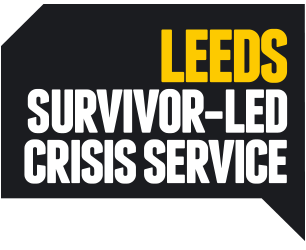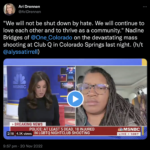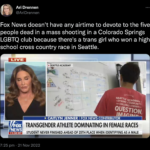Strength from community
By Lulu – Comms Worker and LGBT+ and Trans & Non-binary Group Worker.
CW: discussion of homophobia, transphobia and violence
It’s been a tough time to be LGBT+ lately. There is a general backdrop of a rise in homophobia and transphobia these past few years, the FIFA men’s world cup is currently taking place in a country with a disgraceful record on human rights where being homosexual is criminalised and even punished by death, and on Saturday November 19th someone shot up an LGBTQ+ bar in Colorado Springs, killing five and wounding many others before being stopped by the actions of people there, including a trans woman.
The timing of this incident is significant: the night before Trans Day of Remembrance, when we remember and mourn the lives lost to transphobia. Two of the five victims were trans and the LGBT+ community feels the pain of the lives lost here in a direct attack against us. What’s worse is that it’s hard to even feel shocked by events like this anymore when every day comedians make hateful jokes and loudly complain about any backlash under the banner of free speech, politicians run on platforms of hate, and a vocal online minority do their best to direct people’s hatred and make LGBT+ feel unsafe – look to the use of the word ‘groomer’ online, how it’s deployed to make people fear anyone not cis-het and is recycled homophobia from previous decades.
It’s hard to remember that they are in fact a minority of people when they make so much noise on the internet where their numbers can be distorted and exaggerated, while they are able to steer the conversation and have their voices amplified when uncritically platformed by institutions that claim to be ‘impartial’. After the shooting, there were expected responses from these certain voices online, seeking to lay blame at feet of the victims in order to further their homophobic and transphobic agenda, while others stayed silent, including allies. It hurts to be alone and to feel like the world doesn’t have your back.
However, I also saw evidence of the inextinguishable LGBT+ community, sharing the correct information to combat the many bad faith actors, revelling in the power and strength of the trans person who stopped the shooter (doing what the police did not), and sending out messages of love and hope, so much stronger than hate. It doesn’t always feel like it’s stronger, but it really is, and the community shows the way. When violence is done to people because of who they are, the community hurts as one. The community shares, it protects, it loves.
I’m focusing on LGBT+ issues and community here, but this of course applies to all communities across race, gender, sexuality, disability, everything. It’s a well-worn line but we really are stronger together and finding our communities is so important, gives us so much strength and hope. When you’re cut off from your people or haven’t yet found them, it can be such a cold and lonely place. The importance of community is well-documented, as is how damaging it can be for LGBT+ people to be cut off, how damaging loneliness and isolation can be.
What are the ways to find community? The internet is good for finding your people without being restricted by time and space. Twitter may be a bit of toxic hellsite but it’s also a place that really helped me find information on ADHD and trans issues and to find my people, especially when you’re still figuring out exactly to what communities you even belong.
But meeting face-to-face, to really feel that social connection, that’s a huge part of combating isolation and experiencing that community feeling. There are all sorts of groups for all communities in Leeds, providing a place to socialise and to share knowledge and resources to point you in the right direction. These can be social groups or can also include peer support groups, where there’s a slightly more structured focus on everyone helping support each other in a safe environment, and there is plenty of evidence to show how valuable peer support can be, that feeling of being among equals, to help and to be helped. (Social groups and peer support groups often overlap as well – just being in the same room as people with similar shared experiences can provide a real sense of support, and plenty of socialising goes on at dedicated peer support groups.)
At LSLCS we have the LGBT+ group every Friday, and the Trans & Non-binary group every third Monday with MESMAC. Say hi if you’re interested in coming along! lulu.spargo@lslcs.org.uk I’ll even bring in some of my own board games for some fun times or we can do some creative days – it doesn’t have to be focused on talking about difficult feelings, as sometimes it’s better to just put that stuff to the side. The world can be difficult and unfriendly so if a group wants to just take a breather from that then that’s what we’ll do at the group. It’s up to everyone in the room, we’re all in the same community and wanting to help each other out as best we can.
Check out all our other groups too, the focus of many being on building community and a friendly social space where it’s safe to share your experiences and feelings and be supported by others.
It feels a bit cheesy to finish on a sort of advert for LSLCS services, but I wholeheartedly believe in the value of groups like the ones at LSLCS can help people feel like they are a part of something, that they make sense, that they are not alone, and that they can flourish.



